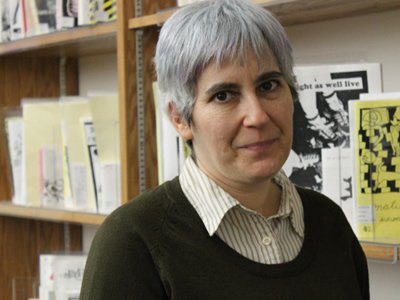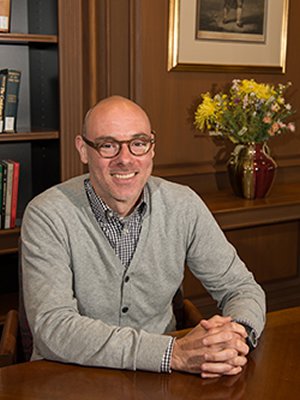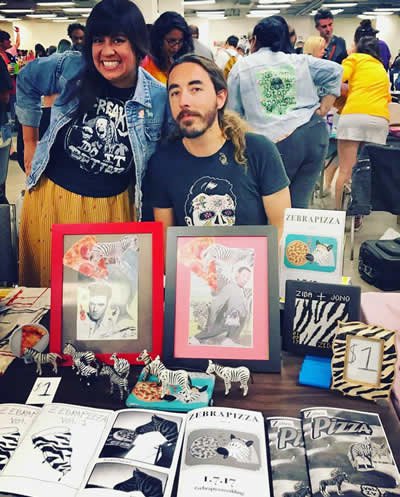Barnard Zine Librarian to Headline Syracuse Symposium April 5-6
Zine maker, librarian Jenna Freedman will present lecture, workshop

Syracuse Symposium continues its yearlong look at “Belonging” with a visit by renowned zine maker and librarian Jenna Freedman.
A member of Columbia University’s Barnard College, Freedman will headline a lecture and workshop collectively titled “Classification and Language(s) of Belonging,” April 5-6.
On April 5, Freedman will discuss “Zine Librarianship as Critical Practice” from 5:15-6:30 p.m. in the Peter Graham Scholarly Commons (114 Bird Library). Communication Access Realtime Translation (CART) services will be provided. The following day, she will present a workshop called “Seizing the Means of Publication: Zine Making” from 9 a.m. to noon in 002 Bird.
Both events are free and open to the public; however, registration is required for the April 6 workshop. Please R.S.V.P. Patrick Williams, librarian for literature, rhetoric and digital humanities at Syracuse, by calling 315.443.9520.

Syracuse University Libraries, the School of Information Studies (iSchool) and the Department of Writing Studies, Rhetoric and Composition in the College of Arts and Sciences (A&S) are sponsoring Freedman’s visit. For more information about her or Syracuse Symposium, contact the Humanities Center in A&S at 315.443.7192, or visit humcenter.syr.edu.
“Jenna Freedman is a nationally renowned activist librarian, committed to elevating the role and function of academic libraries,” says Vivian May, director of the Humanities Center and professor of women’s and gender studies in A&S. “She is particularly interested in the impact of zines and other forms of alt press on librarianship. Jenna will discuss how zines not only foster community, but also document contemporary popular culture in bold, new ways.”
Williams is co-organizing Freedman's visit with Rachel Clarke, an assistant professor in the iSchool. He says both events will consider how librarianship supports higher education, particularly student learning and faculty scholarship, while facilitating community building and knowledge formation.
“Librarians and other library staff engage in work, such as collecting diverse materials and creating space for conversations, that is not always driven by the curriculum,” Williams points out. “Jenna contends that librarians perform their roles with empathy and a critical eye, thus opening up new possibilities for creative and academic projects."
Zines and activist librarianship underscore much of Freedman’s work at Barnard, where she is an associate director of communications; the founder and curator of the college's zine library; and a personal librarian for transfer and commuter students and for the Women’s, Gender and Sexuality interdisciplinary department.
A national authority on zines, Freedman works with handmade magazines of all shapes, sizes and formats. Most zines are handmade, photocopied or stapled; others are more polished in appearance. They cover myriad themes and topics—from feminism, music and politics to movies, literature and arts and crafts. "Zines draw from the traditions of comic strips and artist's books," Williams says.
Freedman is an avowed digital humanist, as evidenced by her leadership roles at zinecat.org, a union catalog dedicated to zines, stemming from her recent M.A. work at the CUNY graduate center; radicalreference.info, providing online reference services to activists, journalists and researchers; and critlib.org, dedicated to exploring critical perspectives on library practice.

"Zines are a unique form of self-expression, done as a labor of love rather than for profit,” Williams says. “The writing, design, production and circulation of zines offer students opportunities to develop information literacy and to follow personally meaningful modes of inquiry. Also, many libraries are adding zines to their collections, for their unique value as primary source material for future scholarship. Zines represent a way to include work by students in library collections.”
Adds May: “Zines originated in the 1950s and ’60s, and saw a brief resurgence in the ’90s. Today, they are thriving, thanks to the internet and social media. … Zines often reside at the intersection of art and activism, and help preserve and amplify voices out of the mainstream.”
Organized and presented by the Humanities Center, Syracuse Symposium is a public humanities series that revolves around an annual theme. Programs include lectures, workshops, performances, exhibits, films and readings. Located in the Tolley Humanities Building, the Humanities Center serves the campus community by cultivating diverse forms of scholarship, sponsoring a broad range of programming and partnerships and addressing enduring questions and pressing social issues.
